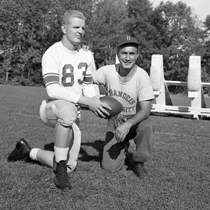
Bill McKenna ’55 with Coach Benny Friedman
The Ultimate Test of Character
More than six decades ago, at the foot of a stone castle on the crown of a hill in the heat of an August afternoon, I first met Bill McKenna ’55, the son of an Irish milkman. A tall, blond, curly-haired, blue-eyed, long-limbed boy of 18, he would become my first friend, my best friend, my teammate, my captain, the brother I never had. When we met on that cloudless day in 1951, it seemed we would never grow old. But we did. And on Oct. 18, 2012, at the age of 79, Bill died.
In that summer of 1951, Brandeis was three years old, had not graduated a single class, was not accredited, had 450 students and was about to field its first intercollegiate varsity football team. Benny Friedman, famed University of Michigan quarterback and two-time All-American, was the coach. That summer, he was looking for another Bennie Oosterbaan — his All-American end at Michigan, the man who caught his passes. Somehow, he saw the makings of greatness in Bill, a raw 6-foot-3, 170-pound boy. Benny was right. Four years later, Bill would be Brandeis’ first All-American, graduating with honors with a degree in physics.
From the beginning, the university’s savvy founders understood that, to succeed on a national level, Brandeis must be seen as more than a place where young Jewish students could be found, noses buried in books, in dark corners of the library. Brandeis, they understood, must be perceived as an all-American university that encompassed a vigorous athletic program along with rigorous academic standards.
The challenge was great: recruit a group of true student-athletes representing all races and all religions for the football program. Bill filled that call to action perfectly. His time at Brandeis was divided among the practice field, the playing field, the science lab and the lecture hall. Brandeis founding President Abram Sachar and Benny brought Bill, Brandeis football’s poster boy, to fundraising events across America. Sachar even asked him to lead the effort to secure church approval for the construction of a Catholic chapel at Brandeis.
On the playing field, few balls thrown Bill’s way eluded his reach. That enormous wingspan encircled not only footballs but his teammates as well. Exhortation was not his style. He led us by example. His theory was if he could do it, we all could do it — we just had to believe it was possible, prepare exhaustively, support one another and work as a team. At many games, little upstart Brandeis was clearly overmatched in size and experience. Bill loved these challenges, which often culminated with a victory — or a collective shiver on the part of a nationally known team.
If you were ever in the huddle with Bill, you occupied a special place in his heart, for he felt that football was not just a game. To Bill, football represented the ultimate test of character, because on the playing field there was nowhere to hide.
Bill was not only a great athlete — he also excelled in baseball and hockey — he was intelligent, inquisitive and well-read across many subjects. He did not curse or speak unkindly of others. He was big in size but gentle in nature, had enormous hands but a tender touch, and was deeply observant of his faith but extremely tolerant of the belief — or nonbelief — of others. Bill loved art in general and American jazz in particular, and he was a terrific cook, an industrial-strength Sicilian meat sauce being his specialty. Watching him dance was a sight; his thighs like tree trunks matching the beat of the music, his watermelon-sized hands gently guiding his partner, he glided across the dance floor like Fred Astaire.
Bill’s friendship was one of the greatest accomplishments of my life. I miss our weekly two-hour conversations. We talked about books, sports, history, politics, the oil business, grandchildren, Brandeis and, of course, “Benny’s boys.” His teammates were always in his mind, as young as they had been 60 years ago.
I mourn Bill McKenna’s passing. The loss is great. But I know that my grief is the requisite other side of my love for him, for the counterpoint of unspeakable grief is abiding love.
— Myron Uhlberg ’55
Myron Uhlberg, a retired businessman and an award-winning children’s book author, was inducted into the Joseph M. Linsey Brandeis Athletic Hall of Fame in 2008.
Gifts in Bill’s honor may be made to the Bill McKenna Fund either online (http://givingto.brandeis.edu) or by mail. Make checks payable to Brandeis University and include “Bill McKenna Fund” on the memo line. Checks should be mailed to: Patricia Ryan, Office of Development and Alumni Relations, Brandeis University, Mailstop 126, Waltham, MA 02454-9110.
